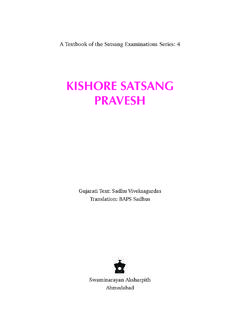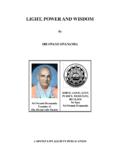Transcription of Satsang Sikshan Parixa SATSANG PRAGNA - 1 : …
1 SATSANG Sikshan ParixaSATSANG PRAGNA - 1 : PAPER - Complete the following quotations. (Total Marks: 9)Note: For above question Vachanamrut quotations will be asked from as one s mind is polluted by association with the immoral, association with God or his Santpurifies one s mind. Even if one s mind is polluted, it is purified by listening to the words of Godand his Sant. (Gadhada I 18: Denouncing the Vishays; A Haveli) , however, due to the constraints of one s religious vows, one is unable to touch such a greatSant, then merely touching the dust of his feet to one s head makes one pure. Likewise, one ispurified by the darshan of the great Sant; but of course one should do darshan while respectingone s religious vows. One is also purified by eating his pras d. (Gadhada I 18) one indulges only in pure vishays through the five indriyas, then one s antahkaran becomespure.
2 If the antahkaran becomes pure, one will be able to constantly remember God. However,if the objects of indulgence of even just one of the five indriyas is impure, the antahkaran will alsobecome impure. Therefore, the sole cause of any disturbance experienced by a devotee of Godduring worship is the vishays of the five indriyas, not the antahkaran. (Gadhada I 18) of how evil a person may be before joining the SATSANG fellowship, he should beaccepted into SATSANG after he takes the appropriate vows. If after joining SATSANG , however, thatperson retains his evil nature, he should be removed from SATSANG . If he or she is not removed,then much harm will result. (Gadhada I 18) anyone attempts to imitate me, he will definitely suffer. Why? Because Nar-N r yan resideswithin my heart. Moreover, I am eternally liberated. I have not become a mukta through thepreaching of others.
3 I exercise complete control over my man, buddhi, chitt and ahamk r. In fact,I seize my antahkaran just as a lion clutches a goat. (Gadhada I 18) have become muktas and countless more will become so. Amongst them, none havebeen able to indulge in pleasures of the senses and yet remain uninfluenced by them; none willbe able to do so in the future; nor is there anyone like that presently. Even one who hasendeavoured for countless millions of years is incapable of remaining uninfluenced amidsttemptations. (Gadhada I 18) may have the virtue of tm -realization, but if one does not have love towards God, thenone does not attain the favour of God, which can only be attained by such love. Such favourresults in the attainment of the desirable and great divine power of not being overpowered by thegunas of m y . (Gadhada I 19: The Interdependency of tm -realization and Other Virtues) a person who has attained SATSANG , realization of his jiv tm does, indeed, lie in his ownhands.
4 One who contemplates on the glory of God and draws within oneself sees one s own selfas extremely pure and luminous. In the midst of that luminance, one beholds the form of themanifest PurushottamBhagw n and experiences bliss in the manner of N rad and theSanak dik. Therefore, all deficiencies which do remain in a devotee are due to his own lethargy.(Gadhada I 20: An Ignorant Person; Seeing One s Own Self) as the jiva indulges in a countless variety of sights with the eyes, it similarly indulges in andknows the pleasures of the other vishays with the ears, skin, tongue and nose; but it does notindulge in the bliss of its own self; nor does it know its own nature. For this reason, it is the mostignorant of the ignorant, the most senseless of the senseless, the most foolish of fools and thevilest of the vile. (Gadhada I 20)10.
5 Unshakeable resolve in observing the dharma of one s varna and ashram; intensely firm tm -realization; dislike for all objects except God; and bhakti which is devoid of all desires for fruits,and which is accompanied with an understanding of God s glory. It is through these four spiritualendeavours that God can be extremely pleased. They are collectively known as ek ntik dharma.(Gadhada I 21: One Possessing Ek ntik Dharma; The Two Forms of Akshar)11. Such an ek ntikbhakta leaves his body and becomes free of all influences of m y , he attainsAkshardh m via the archim rg. That Akshar has two forms. One, which is formless and purechaitanya, is known as Chid k sh or Brahmamahol. In its other form, that Akshar remains in theservice of PurushottamN r yan. A devotee who has reached Akshardh m attains qualitiessimilar to those of Akshar and forever remains in the service of God.
6 (Gadhada I 21)12. All of our satsangis should develop the following singular conviction: We also wish to join theranks of the aksharrupmuktas and go to Akshardh m to forever remain in the service of have no desire for the temporary and vain worldly pleasures; nor do we wish to be temptedby them in any way. Keeping such a firm conviction, one should offer ek ntik bhakti to God.(Gadhada I 21)- 1 -13. When one has developed sourness in the form of faith in God and an understanding of his glory,one s gums in the form of the four antahkarans and ten indriyas become sensitized. In thatstate, the jiva is unable to chew chan in the form of thoughts for the vishays with its gums inthe form of the man. (Gadhada I 24: The Elevated Spiritual State of Jn n; Sourness in theForm of the Understanding of God s Glory)14.
7 The form of God transcends m y and its gunas, and is free of all types of flaws, but it is forthe sake of the liberation of jivas that he appears to be like a human. In fact, God is devoid ofeach of the flaws that senseless people attribute to him. However, the intellect of the personattributing such flaws will never be freed of those flaws that he attributes to God. (Gadhada I 24)15. Whatever types of flaws a person attributes to God will ultimately cause misery to the personhimself. On the other hand, if a person realizes God to be absolutely flawless, then regardlessof his own swabh vs, he himself becomes absolutely flawless as well. (Gadhada I 24)16. When a fault is noticed in a devotee, one should think, His swabh v is such that it is not suitablein the SATSANG fellowship; nevertheless, he has attained SATSANG .
8 Regardless of what he is like,he has still remained in the SATSANG fellowship. Surely, then, his samskars from past lives or fromthis very life must be extremely favourable for him to have attained this SATSANG . With thisunderstanding, one should highly appreciate even such a person s virtues. (Gadhada I 24)17. With this understanding, he has the conviction that no one except the incarnate form of God isthe cause of these wonders. He realizes, The countless wonders which have occurred in thepast, those which are currently taking place, and those which will occur in the future are all onlydue to the manifest form of God that I have attained. (Gadhada I 27: The Understanding byWhich God Eternally Resides Within One)18. He also possesses countless noble virtues such as jn n, bhakti, vair gya, etc. God eternallyresides in the heart of such a , by the grace of God, that devotee attainscountless types of powers and liberates countless beings.
9 Despite these powers, though, hetolerates the praises and insults of other people. This itself is also a great feat, because totolerate despite being so powerful is not easy for others to achieve. Therefore, one who toleratesin this manner should be considered to be extremely great. (Gadhada I 27)19. A person with such firm conviction that God has a form, even if he is an ordinary person, is stilldear to me. K l, karma and m y are unable to administer their power over him. In fact, Godhimself imparts any punishment that he is to receive, but no one else has any authority over him.(Gadhada I 37: Attachment to One s Native Place; Eleven Honours)20. A Sant with such a conviction is so highly respected by me that even I place the dust of his feeton my head. In my mind, I am afraid of harming him, and I also long to have his , one who wishes for liberation through the grace of God is wise, like one who wishesto cross the ocean with the help of a ship.
10 After leaving their body, all those with such knowledgeof God s form attain a form of chaitanya in the abode of God and forever remain in his servicein his presence. In fact, the darshan of such a true Bhakta of God is equivalent to the darshanof God himself. He is so great that his darshan alone can redeem countless wretched jivas.(Gadhada I 37)21. Affection is constantly remembering God s form. That is called affection. A devotee with such totalaffection for God never has any thoughts other than those of God. The extent to which heharbours desires other than those of God is the extent to which he lacks in his affection.(Gadhada I 44: A Red-hot Branding Iron; ADagli)22. After discarding the feelings of I-ness and my-ness for the body and its relations, believing one s tm to be brahmarup, and after forsaking all worldly desires, if a person worships God whileobserving swadharma, he should be known as a sadhu.











